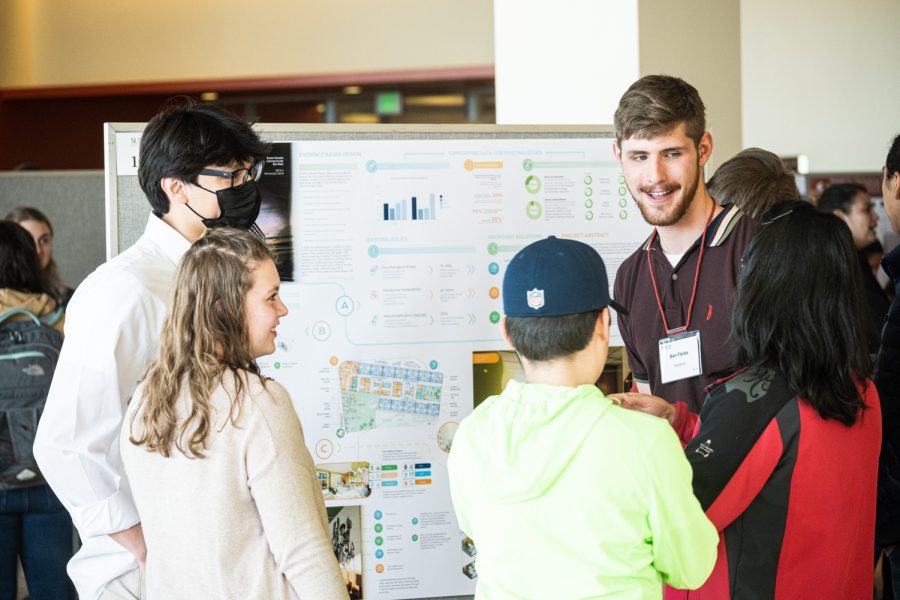SURCA presentation promotes student research, academic achievement
Nine different categories were included in showcase, allowing several students to get awards
Students present their research findings to their peers and judges at the Showcase for Undergraduate Research.
March 31, 2022
On March 28, the Showcase for Undergraduate Research and Creative Activities, hosted by the Office of Undergraduate Research, took place in the Compton Union Building senior ballroom. There were 140 students across different WSU campuses who presented their research findings and proposals to the public.
“SURCA is an [annual] celebration of all the efforts that undergraduate researchers put into expanding their understanding of their disciplines,” said Jeremy Lessmann, director of the Office of Undergraduate Research.
All undergraduate researchers, regardless of their year, developed oral presentations with an accompanying poster. Students who could not present in person were given the opportunity to present over Zoom, said Beverly Makhani, director of communications and marketing for the Division of Academic Engagement and Student Achievement.
SURCA featured nine categories for presenters to choose from, which included humanities, social sciences, applied sciences, and arts and design, according to the website.
There was also a research proposal category for students who had a plan or outline for their project but could not finish data collection because of COVID-19 or time constraints, Lessmann said.
In order to present at SURCA, undergraduate researchers were required to have been involved in mentored research or a scholarship, he said.
Additionally, recipients of the undergraduate research awards were required to present at SURCA. However, those recipients were only a small fraction of the total number of presenters, Lessmann said.
Along with presenters, SURCA allowed faculty and postdoctoral students to judge presentations at the event based on both how the student presented their research and the students’ research in general, he said. There were over 90 judges at the event.
“You need to make sure you have enough judges to cover each category,” Lessmann said. “We like to have an equal number of presenters and judges.”
SURCA has been operating since 2012. This year’s event was the first in-person showcase since 2019, Makhani said. Students and faculty told her how happy they were to attend in person.
“There is a sound and a buzz going through the room right now, which has been missing,” Lessmann said. “I think it’s great to have it back.”
At 5 p.m., SURCA concluded the event with an awards ceremony. Presenters in each category were eligible for one of three monetary awards in order of the lowest amount to the highest amount: the Novice award, the Grey award and the Crimson award.
Awards were determined based on the total score of the presentations from the judges, and each presentation was looked at by three judges, Lessmann said.
Noah Howell won the humanities category.
In the engineering and physical sciences category, Eric Whitley received a Novice award.
Joshua Bilsky, Emma Speight, Zakora Moore, Emma Gunter, Jacob Mahon, Reid Parsons, Evan Rodriguez, Calli Shafer, Caden Weiner and Rachel Willison each received a Grey award.
Eleanor Curtright, Christine Lovingier and Gunnar Sly each received a Crimson award.
In the arts and design category, Ailee Simpson won the Grey award, and Ruben Estrada, Ben Fleiss and Camree Kunze won the Crimson awards.
In the social sciences category, Jacqui Thomasson won the Novice award. Sierra Sumner, Brianna Cabral and Bailey Maykovich each received a Grey award. Mollee Gray, Caitlin Ottaway, Matteya Proctor and Cheyenne Schneider each received a Crimson award.
Dana Pittman was the only award recipient in the computer science, mathematics, statistics and information sciences category.
In the organismal, population, ecological and evolutionary biology category, Alexander Iritani won the Grey award, and Randi Richards won the Crimson award.
In the molecular, cellular and chemical biology category, Rafael Urrutia-Camargo, Stephen Fawcett, Sean Thompson, Natalie Williams, Alexandra Puzon, Ty Gray and Justine Strickler each received a Grey award.
Evelyn Rowe, Olivia Hayden and Alexandra Malena all received Crimson awards in that category.
In the research proposal category, both Olivia Willis and Maya Nuno won a Grey award, and Kalli Stephens won a Crimson award.
In the applied sciences category, Ivy Woltering won a Grey award, and Lauren Forseth won a Crimson award.










